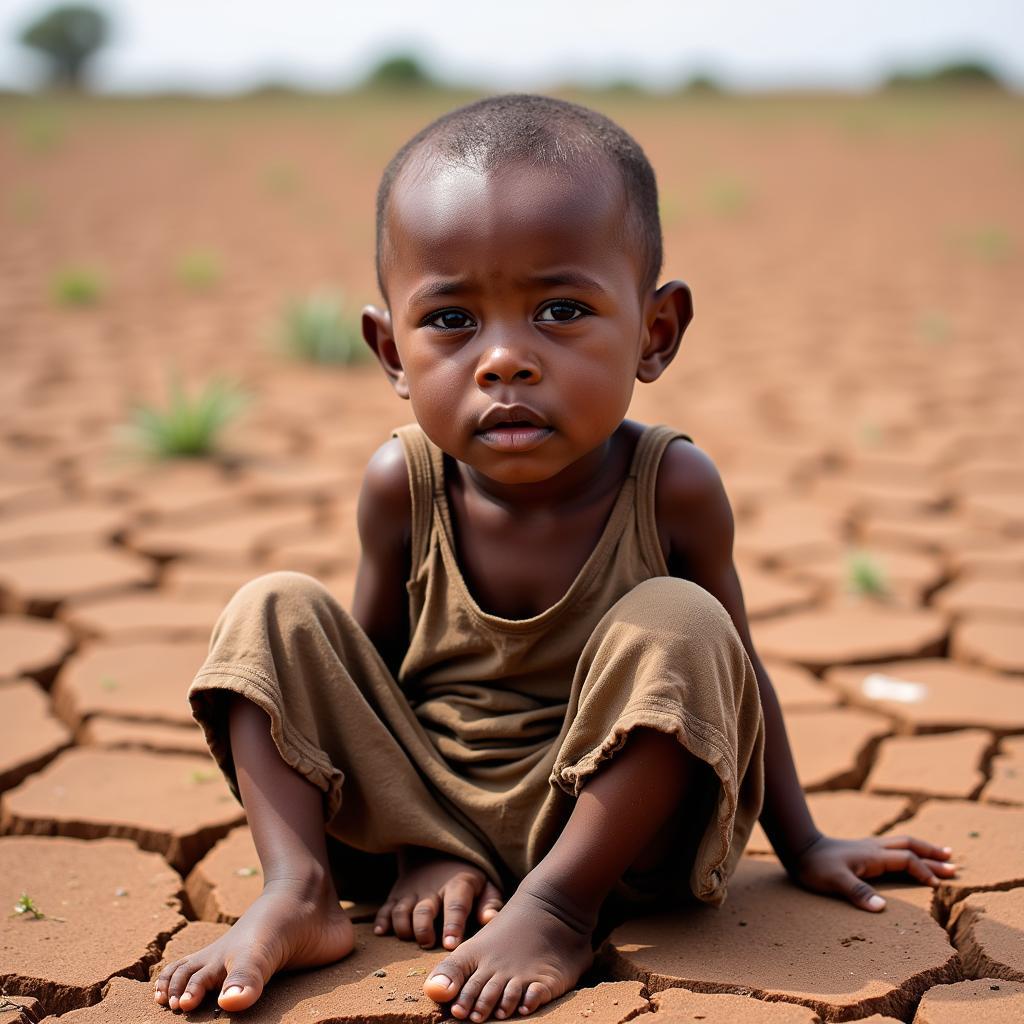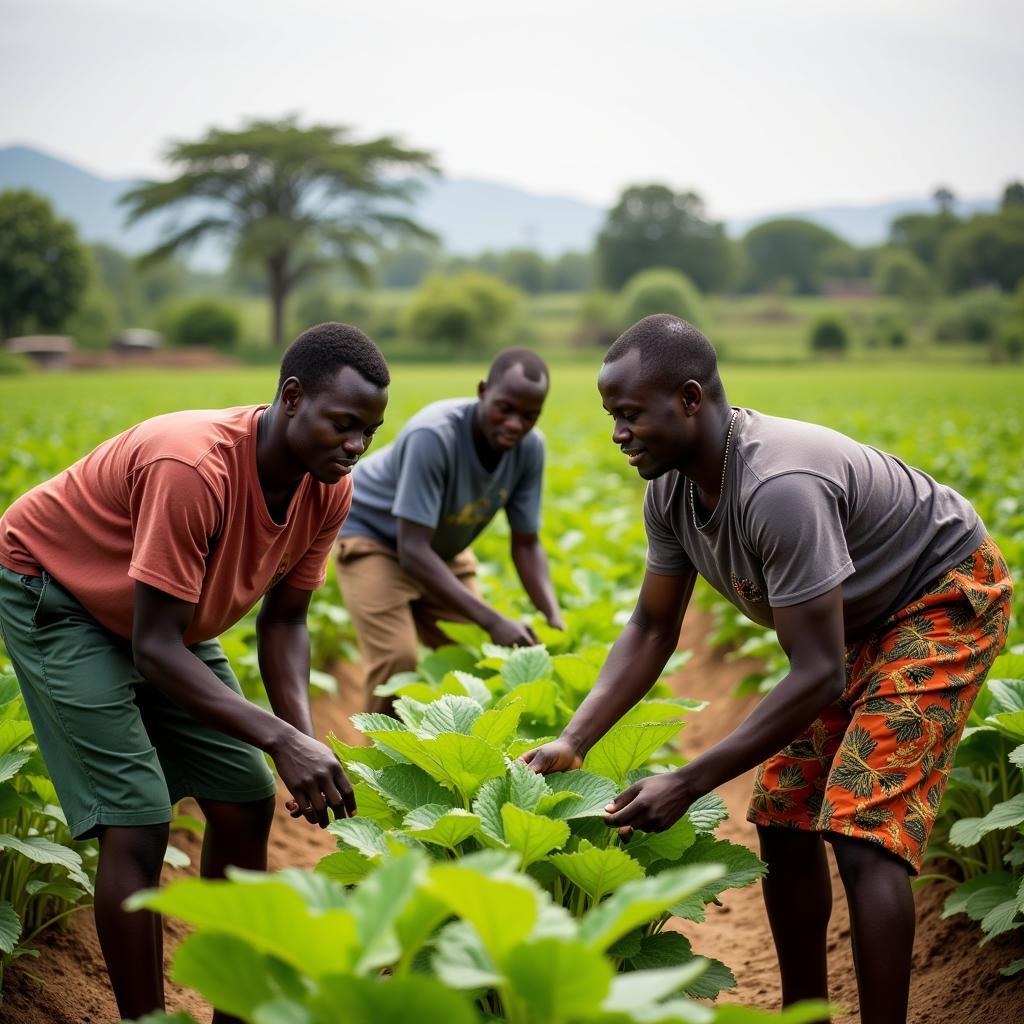The Tragic Reality of an African Child Dying of Hunger
The heartbreaking image of an African Child Dying Of Hunger is a stark reminder of the persistent challenges faced by millions across the continent. Food insecurity, driven by factors like poverty, conflict, and climate change, continues to threaten the lives and well-being of vulnerable populations, especially children. This article delves into the complexities of this issue, exploring its root causes, devastating consequences, and potential solutions.
Understanding the Root Causes of Hunger in Africa
Several interconnected factors contribute to the tragic reality of children facing starvation in Africa. Poverty often limits access to nutritious food, leaving families dependent on meager resources and vulnerable to price fluctuations. Conflict and displacement disrupt agricultural production, forcing communities to flee their homes and livelihoods, leaving them with little access to food. Climate change, with its erratic weather patterns and increasing frequency of droughts and floods, further exacerbates food insecurity, impacting crop yields and livestock production. Additionally, inadequate infrastructure and limited access to healthcare services worsen the situation, making children more susceptible to malnutrition and disease.
The cycle of poverty is a significant contributor to hunger. Families struggling to make ends meet often lack the resources to invest in education, healthcare, and other essential needs, perpetuating the cycle of poverty and vulnerability to food insecurity. This is further complicated by limited access to land and resources, particularly for marginalized communities.
After the first rain, farmers start preparing their land. But what if the rain never comes? What if the land is barren and dry? This is the harsh reality faced by many families across the continent, highlighting the precarious nature of subsistence farming in the face of climate change.
 African Child Suffering from Hunger Due to Poverty
African Child Suffering from Hunger Due to Poverty
The Devastating Consequences of Hunger on African Children
The consequences of hunger on African children are devastating and far-reaching. Malnutrition weakens the immune system, making children more vulnerable to infectious diseases, which can be fatal in the absence of adequate healthcare. Chronic hunger also impairs physical and cognitive development, impacting their ability to learn and thrive. This creates a long-term cycle of disadvantage, limiting their opportunities for education, employment, and a fulfilling life.
Beyond the immediate physical effects, hunger also takes a toll on children’s mental and emotional well-being. The constant stress and anxiety associated with food insecurity can lead to psychological trauma and developmental delays. Children experiencing hunger often struggle in school, impacting their educational attainment and future prospects.
Potential Solutions and the Path Forward
Addressing the complex issue of hunger in Africa requires a multi-pronged approach. Investing in sustainable agriculture and supporting smallholder farmers can improve food production and resilience to climate change. Strengthening social safety nets and providing food assistance to vulnerable families can help alleviate immediate needs and break the cycle of poverty. Improving access to healthcare and education is crucial for ensuring children’s long-term health and well-being.
Conflict resolution and peacebuilding efforts are essential for creating stable environments where communities can thrive and access food. Empowering women and promoting gender equality is also crucial, as women play a vital role in food production and household food security. african child stomach provides a more in-depth look at the physical effects of malnutrition.
Furthermore, promoting sustainable development initiatives and addressing the root causes of poverty can create long-term solutions to hunger and malnutrition. International cooperation and partnerships are essential for mobilizing resources and expertise to support African countries in their efforts to combat hunger. The story of the african child who was going to dying of hunger serves as a powerful reminder of the urgent need for action.
 African Community Farming for Food Security
African Community Farming for Food Security
Conclusion: A Call to Action to End Hunger in Africa
The plight of an African child dying of hunger is a call to action for the global community. While significant progress has been made in reducing hunger globally, much more needs to be done to address the persistent challenges in Africa. By working together, we can create a future where every child has access to the nutritious food they need to thrive. african child and vulture reminds us of the devastating impact of inaction.
FAQ
-
What are the main causes of hunger in Africa?
Poverty, conflict, climate change, and lack of access to resources are some of the key drivers of hunger. -
How does hunger affect children’s health?
Malnutrition weakens the immune system, making children more susceptible to diseases. It also impairs physical and cognitive development. -
What can be done to address hunger in Africa?
Investing in sustainable agriculture, strengthening social safety nets, and improving access to healthcare and education are crucial steps. -
What is the role of climate change in food insecurity?
Erratic weather patterns and extreme events like droughts and floods significantly impact crop yields and livestock production. -
How can I contribute to ending hunger in Africa?
Supporting organizations working to address hunger and advocating for policies that promote food security are ways to make a difference. -
What are some of the long-term consequences of childhood hunger?
Reduced educational attainment, limited employment opportunities, and increased vulnerability to poverty are some of the long-term impacts. -
What are some successful initiatives in combating hunger in Africa?
Community-based farming programs, school feeding initiatives, and cash transfer programs have shown positive results in addressing hunger.
Common Scenarios and Questions
-
Scenario: A family loses their crops due to drought.
-
Question: What resources are available to help them access food?
-
Scenario: A child is showing signs of severe malnutrition.
-
Question: Where can they receive medical treatment and nutritional support?
Further Exploration
For more information on related topics, explore resources on child health, food security programs, and sustainable development initiatives in Africa.
Call to Action
If you need assistance or would like to contribute to our efforts, please contact us: Phone: +255768904061, Email: kaka.mag@gmail.com, or visit us at: Mbarali DC Mawindi, Kangaga, Tanzania. We have a 24/7 customer service team.

